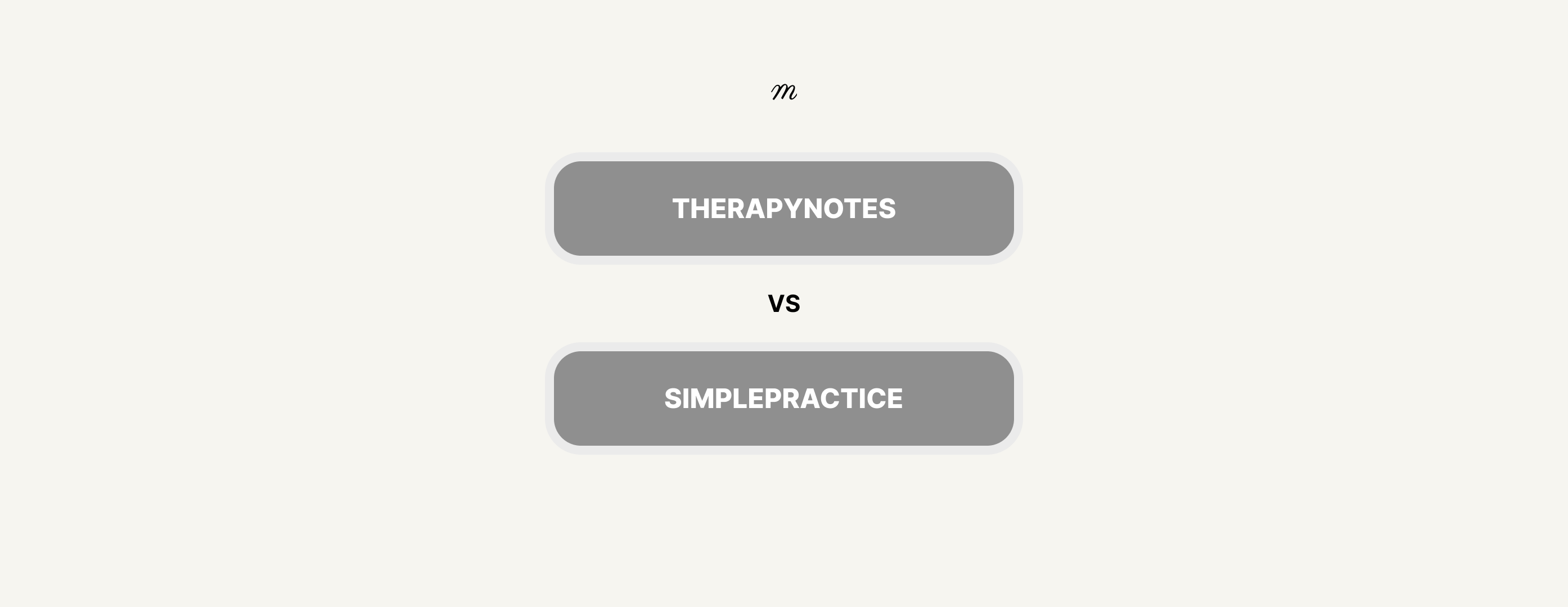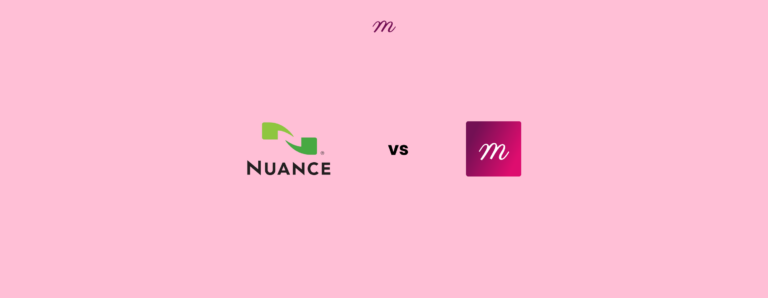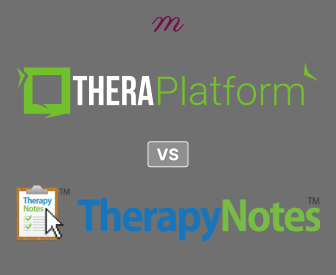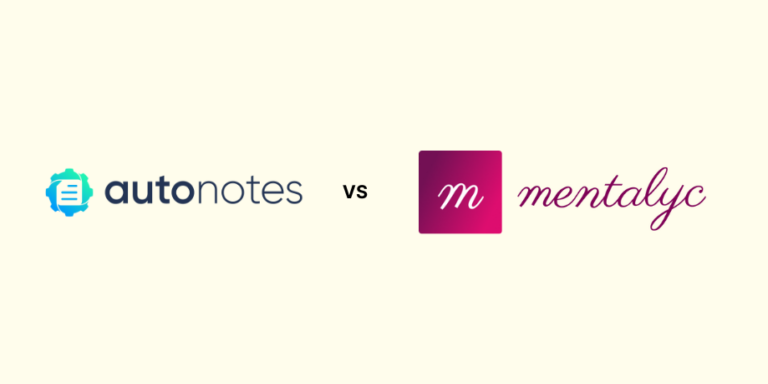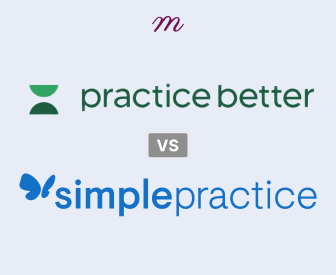Have your progress notes written for you automatically
SimplePractice and TherapyNotes are two popular electronic health records (EHR) and practice management platforms that offer several great features for mental health professionals. TherapyNotes delivers simple efficiency, while SimplePractice offers a wealth of premium options. This article explores how each platform differs in features, cost, and value.
How User-Friendly are the Platforms?
TherapyNotes is known for its user-friendly and intuitive interface. It has a straightforward design that’s easy to navigate, making it suitable for both beginners and experienced users.
SimplePractice also offers an intuitive and user-friendly interface. It’s designed to be easy to use and has a clean, modern look.
Features and Functionality
TherapyNotes
offers appointment scheduling and reminders.
includes billing and invoicing features with support for insurance claims.
provides notetaking and treatment planning capabilities.
includes secure messaging for client communication.
allows document and file storage.
offers customizable templates for clinical notes.
provides HIPAA-compliant security.
SimplePractice
offers appointment scheduling and automated appointment reminders.
has comprehensive billing and invoicing features with credit card processing.
includes a client portal for secure communication and document sharing.
offers customizable note templates.
includes telehealth features.
provides progress tracking and goal setting for clients.
offers client intake forms and assessment tools.
Telehealth Capabilities
TherapyNotes offers telehealth capabilities, allowing mental health practitioners to conduct online therapy sessions with their clients. To utilize telehealth services, users must integrate it with a third-party video conferencing platform like Zoom. TherapyNotes doesn’t come with its built-in video conferencing feature, but it can be connected to external platforms to enable telehealth sessions.
SimplePractice includes integrated telehealth functionality, so mental health professionals can conduct online therapy sessions without the need for additional third-party tools or integrations (which are an additional expense with other platforms). The built-in telehealth feature is convenient, as practitioners won’t have to manage multiple software applications. It streamlines the process of scheduling, conducting, and documenting online sessions, making it easier for therapists to provide remote care to their clients.
Both TherapyNotes and SimplePractice offer telehealth capabilities, which are critical for mental health practitioners who conduct virtual sessions. This is required in situations where in-person sessions are not possible. TherapyNotes requires integration with a third-party video conferencing tool like Zoom, while SimplePractice provides a seamless experience with its built-in telehealth functionality. The choice between the two may depend on the specific needs and preferences of the mental health professional.
Customization and Templates
TherapyNotes provides customizable templates for clinical notes and treatment plans, allowing mental health practitioners to tailor their documentation to their specific needs.
SimplePractice also offers customizable note templates and the ability to create intake forms and assessment templates.
Pricing
Pricing for TherapyNotes is based on a monthly subscription fee per user $49/month for one user to $59/month/user for groups and enterprise-level subscriptions. The cost can vary depending on the number of users and additional features required. TherapyNotes offers a free 30-day trial and keeps things simple while offering most of the core features for one price.
SimplePractice has different pricing options for individual practitioners, starting at $29 and going up to $99 per month. The final cost may vary based on the selection of additional features. Although SimplePractice provides many high-quality features, they come at a higher cost. The pricing can be somewhat complex, and choosing extra features might result in a more costly electronic health record (EHR) system than initially expected. The most expensive plan allows the inclusion of more staff and clinicians, but be aware that adding more features can quickly raise the overall price.
Client Portal and Online Booking
TherapyNotes provides a client portal for communication and document sharing, and though clients can book through the client portal, this platform may not have as many advanced online booking features as competitors.
SimplePractice includes a client portal and online booking functionality, allowing clients to schedule appointments online.
Customer Support
TherapyNotes offers customer support during business hours and provides resources like webinars and tutorials. The customer service phone number is at the top of the home page. SimplePractice offers customer support via email and live chat during extended hours, including weekends. They also provide an extensive knowledge base and webinars.
HIPAA Compliance
One of the key features that set TherapyNotes and SimplePractice apart and make them highly attractive to practitioners is their strict adherence to the Health Insurance Portability and Accountability Act (HIPAA) compliance standards.
HIPAA is a U.S. federal law that mandates strict regulations for the protection of client health information. Ensuring HIPAA compliance is essential for mental health practitioners to maintain the confidentiality, integrity, and availability of clients’ sensitive data. Both TherapyNotes and SimplePractice have taken extensive measures to align with these requirements.
One of the core tenets of HIPAA compliance is data encryption. Both platforms use advanced encryption techniques to protect client data both in transit and at rest. So, any information shared or stored within their systems is scrambled into an unreadable format, which can only be deciphered by authorized users with the necessary decryption keys.
HIPAA mandates strict access controls to ensure that only authorized personnel can access sensitive client information. Both TherapyNotes and SimplePractice offer features like role-based access control and user authentication, allowing mental health professionals to limit access to client records to only those who need it for their role within the practice.
To maintain HIPAA compliance, both platforms regularly conduct internal audits and monitoring to identify and rectify any vulnerabilities or potential security breaches. They also provide tools for practitioners to monitor access and usage within their systems, helping them to spot any unauthorized activity.
Both TherapyNotes and SimplePractice offer robust data backup and recovery systems, ensuring that even in the event of data loss, mental health professionals can retrieve client information and continue providing care without interruption.
HIPAA requires healthcare providers to have signed Business Associate Agreements with their service providers. TherapyNotes and SimplePractice offer BAAs, which legally bind them to uphold the level of security and privacy standards required by HIPAA.
Both platforms provide secure communication channels, such as encrypted messaging and video conferencing, which allow mental health professionals to communicate with their clients in a way that complies with HIPAA.
In addition, both platforms offer regular software updates to patch vulnerabilities and provide training and resources to help practitioners and their staff understand and implement best practices for data security.
The commitment of TherapyNotes and SimplePractice to HIPAA compliance is a significant assurance for mental health professionals and their clients. By leveraging these platforms, practitioners can focus on delivering quality care, knowing that the security and privacy of their client data are being rigorously safeguarded.
Pros and Cons of TherapyNotes
TherapyNotes provides a top-notch electronic health records (EHR) system, complete with a complimentary telehealth platform and a user-friendly experience. Although it’s straightforward and easy to set up, TherapyNotes falls short in offering personalized customization options and detailed data reporting.
Pros
All-inclusive one-month free trial; no credit card required.
Excellent user experience.
Free telehealth platform.
Easy to learn and quick to implement.
The Telehealth platform supports up to 16 participants at once.
Supports e-prescriptions.
Cons
Customization is lacking.
Poor selection of pre-generated content such as treatment plan templates, progress note templates, and outcome measures.
Limited reporting capability.
May need to integrate with a third-party platform (e.g., Zoom).
Pros and Cons of SimplePractice
SimplePractice provides several helpful tools, such as a user-friendly interface, easy-to-use scheduling and calendar options, along with extras like the Wiley Treatment Planner and a website creation tool for professionals. However, it is more costly than similar services, and there have been issues regarding the security and privacy of practice and client information.
Pros
Excellent onboarding and customer support.
Attractive, modern interface.
Intuitive calendar.
Professional website builder.
Mobile app for practitioners and clients.
Cons
Relatively expensive.
No e-prescribing features.
The billing system is not as easy or efficient as it should be, for the cost.
The system may not be customizable enough for larger practices.
Lacks user-friendly document submission.
Which Platform Offers the Better Value?
Choosing between SimplePractice and TherapyNotes for your practice depends on what you need. If basic features are enough, TherapyNotes can save you money. However, SimplePractice has extra features that might be useful, even though they cost more.
SimplePractice offers great value for practitioners and practices that focus on marketing and growth, while TherapyNotes offers better value for professionals who want to keep things simple using the core features.
Which Platform Is Right for You?
SimplePractice is a great choice if you can afford a premium service and you want to expand your practice. TherapyNotes is a great option if you just require basic functionality.
Ask yourself the following questions before you choose a practice management/EHR platform:
What are the essential features I require?
What are the more advanced features I’d like to integrate?
What is my budget?
How many clients do I serve? In-person or remotely?
Do I have multiple practitioners or administrative staff in my practice?
Will I be billing insurance? How much experience do I have with this?
Do I need to build a website?
Should You Choose TherapyNotes?
TherapyNotes is an excellent option for small or individual practices, especially for those new to managing a practice. Its main advantage lies in its ease of use and simple setup process. It’s designed for easy and quick start-up, even for beginners in practice management. Plus, TherapyNotes offers outstanding customer support to help you overcome any challenges you might encounter.
Telehealth access is part of the basic subscription. The user-friendly design and clear client portal make running a telehealth or remote practice easy to manage. The platform supports up to 16 people at once, making it simple to hold remote group therapy sessions.
Should You Choose SimplePractice?
SimplePractice streamlines your work with its customizable and automated features, reducing manual tasks and supporting your business’s growth. It comes with premium options, making it an appealing choice.
The platform simplifies paperwork and data entry through user-friendly systems for documentation, scheduling, and client intake. Its automated client portal system makes the intake process smooth, while its automated features for clinical and administrative tasks reduce extra work for you and your team.
Choosing the “Essential” plan or higher grants access to a personalized website builder, a spot in SimplePractice’s ‘Monarch’ therapist directory, and a dashboard for business analytics. These tools can help attract clients and provide valuable insights for informed business decisions.
The Bottom Line:
SimplePractice and TherapyNotes are both excellent electronic health record (EHR) and practice management systems. However, they have some distinct features that can guide your choice. TherapyNotes provides an easy-to-use, though somewhat basic, service. In contrast, SimplePractice offers more options for customization and advanced features.
For individual practitioners needing just the essential functions, TherapyNotes is a great fit. On the other hand, if you’re part of a group practice or need more sophisticated features and don’t mind the extra cost, SimplePractice could be the ideal choice.
The choice between TherapyNotes and SimplePractice depends on your specific needs. Both platforms offer valuable features, but you must consider factors such as pricing, telehealth capabilities, customization options, access to customer service, and user-friendliness when making your decision. Take advantage of free trials offered by both platforms to determine which one best suits your practice requirements.
Disclaimer
All examples of mental health documentation are fictional and for informational purposes only.


